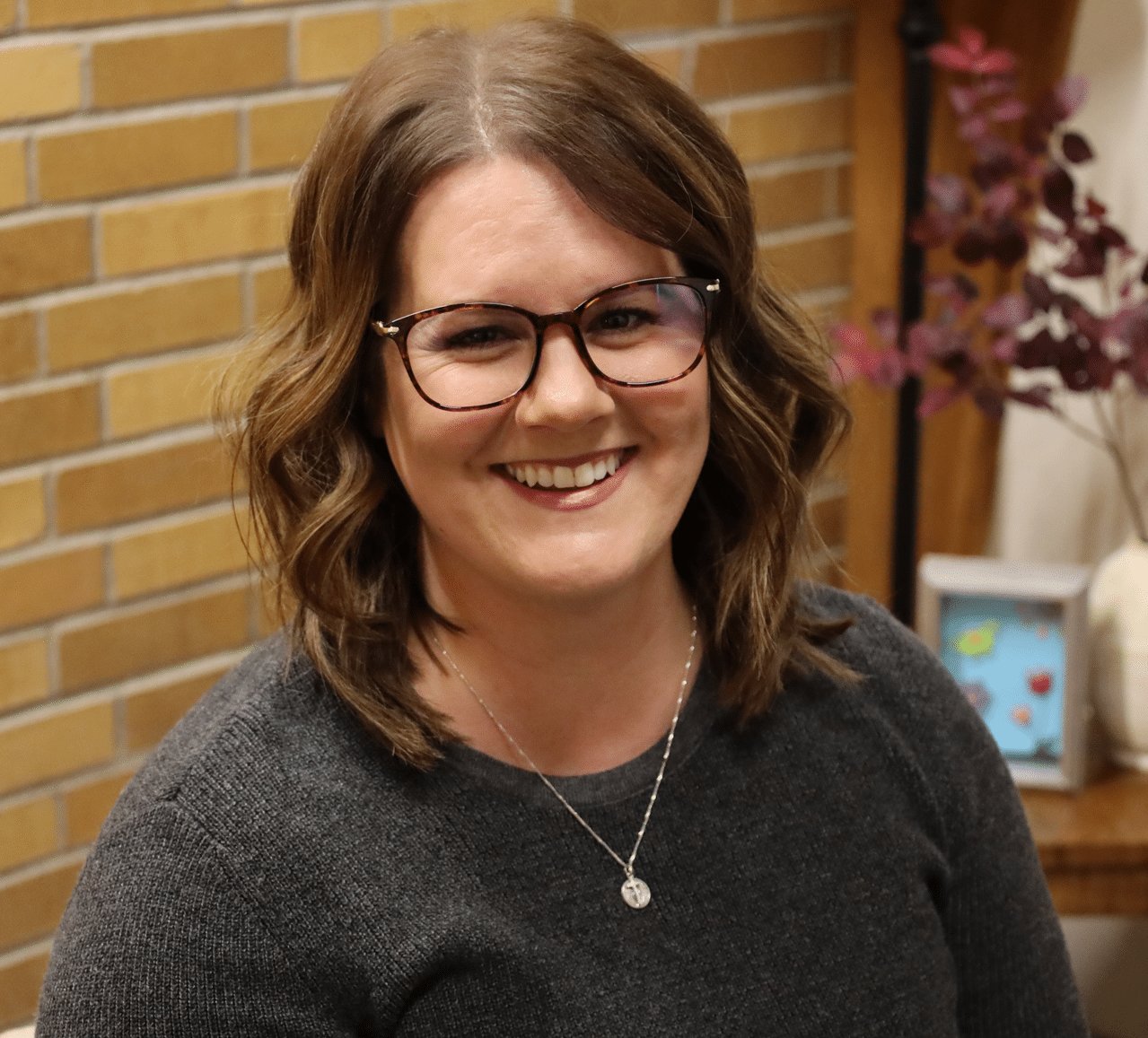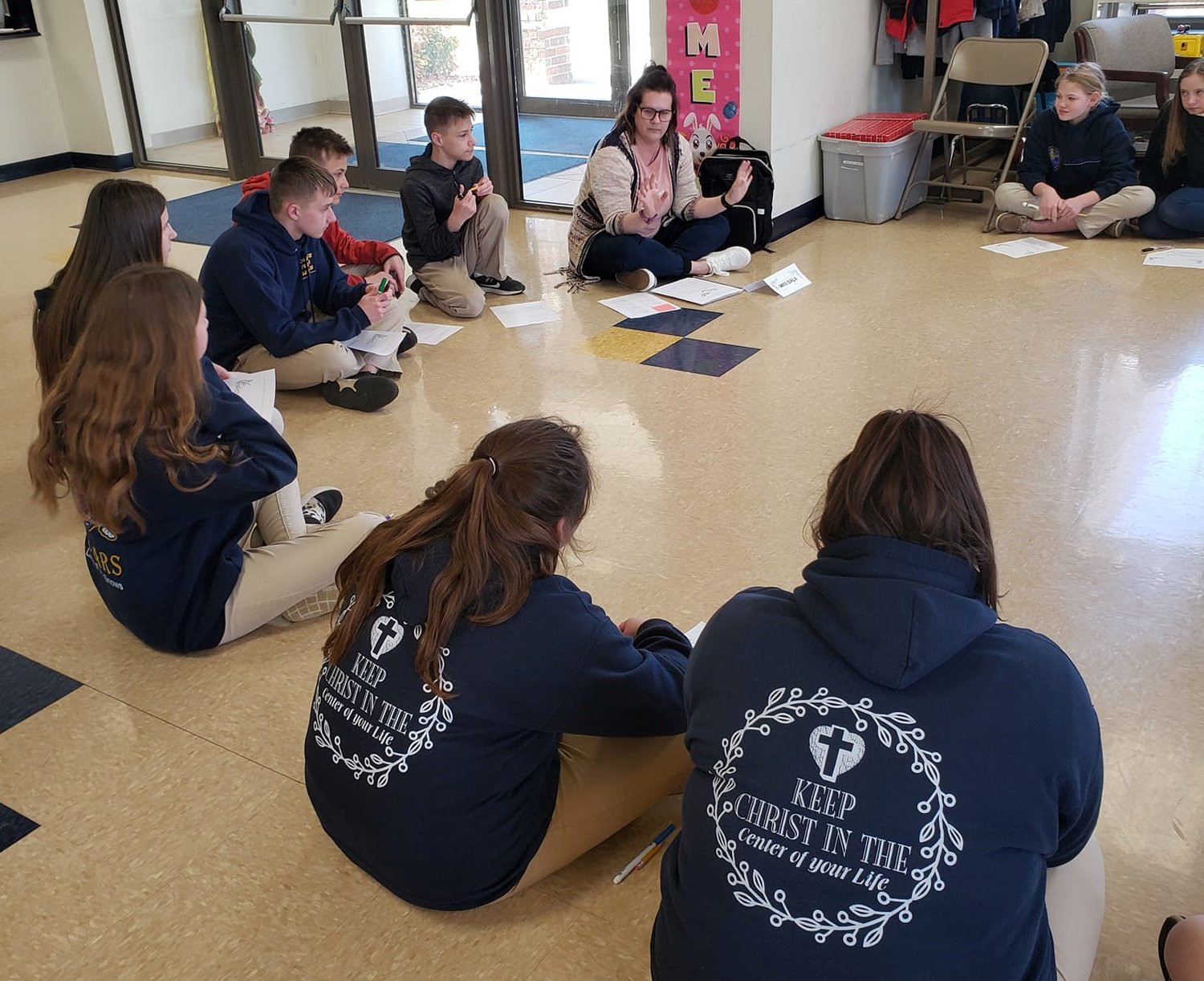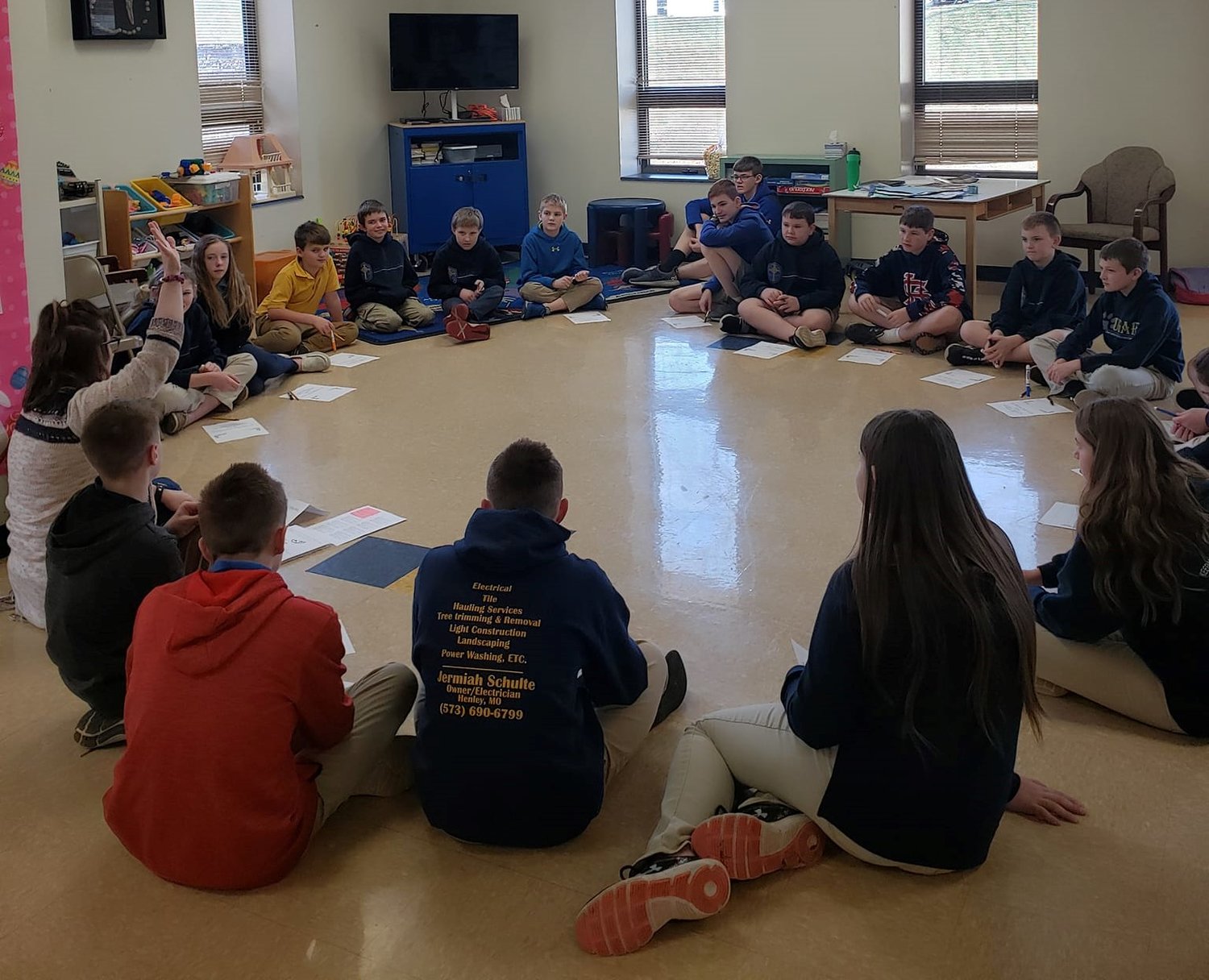Catholic Charities counseling services director and grade-school students learn lessons from each other

Dala Hemeyer wondered how the grade school students she was working with were feeling, so she came right out and asked them.
Offering a list of words ranging from negative to positive, she asked each student to pick the word that best describes his or her own emotions, write it down and submit it to her anonymously.
“So, they’re sitting with me and laughing and joking and seeming connected and supportive of each other, but when I looked at their sheets, I could see that they have some big, hard emotions going on pretty regularly,” said Mrs. Hemeyer, Director of Counseling Services for Catholic Charities of Central and Northern Missouri (CCCNMO).
“Sadness or hopelessness or loneliness — you wonder what a seventh-grader has to feel hopeless about, but it’s in there,” she said. “From the outside, you might not see it. But from the inside, it can be a very different story.”
It was a good lesson for everyone.
“We can’t always see it,” she said. “We need to be aware of how the way we treat other people might be influencing them on the inside.”
Mrs. Hemeyer, a lifelong Catholic with children of her own, has been CCCNMO’s counseling services director since last September.
She is a Licensed Clinical Social Worker (LCSW) and holds a master’s degree in counseling.
Part of her work includes visiting Catholic schools in the Jefferson City diocese and teaching about the importance of mental/emotional health and treating people with kindness and empathy.
“As a Catholic with kiddos, I have a stake in looking to their mental and spiritual health,” she said. “My intention has been to help tie the two together.”
She pointed out that children have many of the same struggles adults have.
“It just shows up in different ways,” she said. “And the schools have noticed that it’s just getting harder and harder to be empathetic as adults, and it’s filtering down.”
She said parents have been asking schools to help them address this challenge.
“As humans, we’re all injured in some way,” she noted. “For some people, that injury influences us more than others.”
The teachers want to help, but like many of the parents, they have a lot of other responsibilities and can’t always give mental and emotional health the level of attention it warrants.
Meanwhile, civility and compassion have been taking a beating in politics, popular culture and social media.
“For us as adults, it can be easy to lose track of how our own actions are impacting those around us and setting examples for the children who are watching,” she said.
Mission oriented
Mrs. Hemeyer recently conducted a six-week series of classes for fifth- through eighth-graders at St. George School in Linn and Our Lady of the Snows School in Mary’s Home, focusing on kindness and empathy.
She built the lessons around tried-and-true emotional learning strategies and curriculum.
“I put a Catholic spin on it, bringing in influences from various saints as well as characteristics we all need to be constantly cultivating that contribute to our own sanctity,” she said.
The program, called “Mission Secret Saints,” reinforces compassion, empathy and mental toughness by “gamifying” acts of kindness.
“Basically, it’s sort of a way to encourage kids to do things that are little more difficult to do,” she said. “We make it into a game. There are challenges they have to work on as a team in order to carry out their mission each week.”
The missions are tied to the social-emotional learning goals.
The program culminates with a service project, with all the students taking part.
“We hear a lot in our society about antisocial behavior,” said Mrs. Hemeyer. “And where our focus goes, that’s what we tend to see, it’s what tends to get elevated.”
“Mission Secret Saints” does the opposite.
“We focus on the pro-social behavior, the things we all need to be doing,” she said. “And when you’re doing more of these things, you’re naturally doing less of the anti-social things.”
Mrs. Hemeyer has also taught lessons at St. Francis Xavier School in Taos and St. Andrew School in Tipton on helping students interact positively with their peers.
She participated in this year’s annual Wellness Day at Immaculate Conception School in Loose Creek, where students learn about various aspects of staying healthy over the summer. She talked to the younger students about physical and online boundaries.
A listening heart
Mrs. Hemeyer grew up in central Missouri, where her potential for being a counselor became evident early on.
“As a kid, I was always that friend who people came to for advice,” she recalled. “I was the one who was willing to listen.”
She was in eighth grade when her grandmother, who lived across the street from her, was dying of pancreatic cancer.
“We visited often,” Mrs. Hemeyer fondly recalled. “It turned out to be a very formative experience for me. In fact, it influenced almost everything I did after that, as far as relationships go.”
She resolved to enter a profession that would allow her to support people emotionally.
“I initially thought that would be grief counseling — helping people who are going through the end of life, or families of such people,” she said.
But she wound up taking more of a generalist route, with counseling studies focused on behavioral health.
She spent 12 years counseling military veterans for the U.S. Department of Veterans Affairs.
“That was not the path I thought would take,” she said. “It was a God thing. It gave me some really good life lessons and insight and experience.”
“Where kindness comes in”
Upon coming to work for Catholic Charities last fall, Mrs. Hemeyer set about putting together a mental health program for the community, as well as supporting any mental health needs identified by Catholic schools in the diocese.
“On the community side of things, that includes helping adults with various kinds of mental-health concerns, a diagnosable illness or any other various concerns that impact our mental wellness,” she said.
That includes such factors as stress, grief, worry or trouble at home with partners, other family members or friends.
“And then additionally, I am a Catholic myself, born and raised, so also when appropriate or when asked, I can bring in a Catholic perspective into the office when people are coming in for treatment,” she said.
Mrs. Hemeyer originally thought that with the schools, she would be working mostly with children who have acute mental health needs.
“And it’s not to say those are not there, but that has not been the path we have been led to,” she said. “We have been contacted by the schools more often than not to come in and talk to the kiddos about everyday things.”
She is often asked to help young people learn to manage stress better and interact with each other in ways that are more compassionate and empathetic.
“That’s where kindness comes in,” she said.
She noted that most adults see difficulties in life through the lens of broader experience.
“Just because something happens, I don’t feel hopeless,” she said. “But kids don’t have the same coping skills that adults have, because they haven’t lived long enough to learn them.”
Also, some children haven’t absorbed effective coping strategies because their parents never learned them.
“So it becomes an intergenerational issue,” said Mrs. Hemeyer.
It takes a community
She said it’s important for parents and school personnel to work together to promote children’s mental and spiritual wellbeing.
“The schools do have those kids the majority of the time they spend awake each week,” she said. “I know parents are incredibly busy and are spread very thin, and so are the teachers.
“So it’s something that needs to be done, and if it can be done while the kids are already in school, why not take advantage of that?” she said. “Then they have their peers around them to help with practicing and reinforcing those things.”
Also essential is for parents to stay connected with their children, engaging frequently in shared activities and discussions.
“These don’t have to be heavy conversations,” she said. “Just make sure you’re talking to them and you know who they’re hanging out with and what they’re doing on their electronic devices and what kind of media they’re consuming.”
Parents need to be familiar with the messages their children are absorbing through social media, television, movies and popular music.
“That’s not to say that those things are always bad influences,” she said. “But if we aren’t tempering the bad influences with the kind of messages we want our kids to be modeling, that’s where it becomes a problem.”
Parents needn’t shelter their children from all media exposure.
“In fact, that would cause all sorts of other problems,” she said. “We just need to be constantly mixing in the lessons and modeling the behavior we want them to be emulating while they’re processing those other things.”
Children also need to know that their concerns are valid and are being taken seriously by adults.
“It can be really easy to hear our kids’ concerns and be dismissive of them, like ‘Oh, it’s not that serious,’ or ‘I grew up with that and did just fine,’” said Mrs. Hemeyer.
“That can be damaging to the connection you might need to have with them at a later time,” she said. “So when your kids talk to you about their thoughts or experiences, give them the same value and concern you would for another adult.
“Make sure that the young people in your life know that you’re available,” she advised. “And listen more than you speak!”
Parents must also make a point of attending to their own emotional needs.
“As parents, we tend to put other things before ourselves,” she said. “But if we’re not taking care of ourselves, it’s really hard to take care of anyone else’s needs.”
In this together
Mrs. Hemeyer said she has thoroughly enjoyed her work with children in schools.
“It has been a huge learning experience for me, and a humbling one at that,” she said. “These kids are funny and smart and have a lot of things to share that are really good for adults to know about.”
She asks for prayers for endurance — “the mental and emotional energy to keep showing up and putting my best foot forward, day in and day out.”
“I carry all these things I see and hear in my heart,” she stated. “That’s both a strength and a weakness.”
She also asks for prayers for the children and parents she works with to have “discerning hearts that are open and moldable and yet protected.”
“Parents are facing big, hard topics with their kids these days, and it’s easy to be paralyzed by the anxiety and the worry and the seriousness of these conversations,” she said.
Mrs. Hemeyer writes a short, informational blog each month on general aspects of mental health for the Catholic Charities website.
Her May offering, which coincides with Mental Health Awareness Month, includes suggestions for breaching the subject of mental health with people who are showing signs of stress, depression or other concerns.
That blog, along with more information about Catholic Charities of Central and Northern Missouri counseling services, can be found at:
Comments
Other items that may interest you
Services
The Catholic
Missourian
2207 W. Main St.
Jefferson City MO 65109-0914
(573) 635-9127
editor@diojeffcity.org








